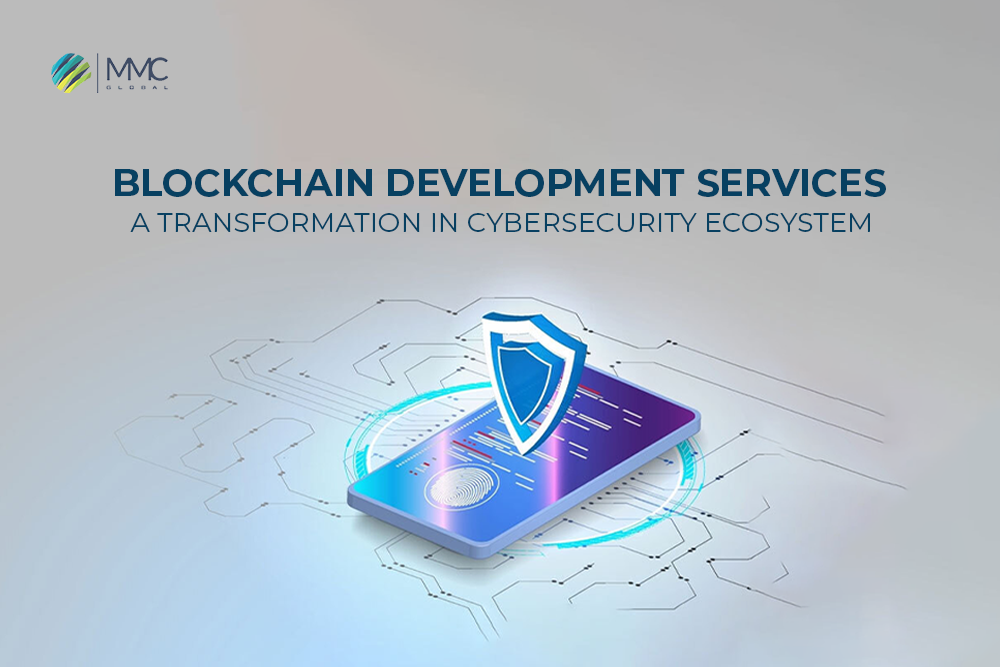Blockchain Development Services: A Transformation in Cybersecurity Ecosystem


Several aspects of our lives are being transformed by blockchain development, and cybersecurity is one of these areas. Traditional ways of protecting data and systems are no longer enough due to the growing sophistication of cyber-attacks. Blockchain development presents a novel solution for cybersecurity that may be more reliable and secure than current approaches.
This article will explore how blockchain development services are changing how we approach cybersecurity.
Read More: How Blockchain Technology Is Transforming The Cybersecurity?
What are Blockchain Development Services?
Let’s quickly describe blockchain development services before understanding how it is transforming cybersecurity. Blockchain is a distributed, decentralized ledger that keeps track of transactions across many computer systems. A chain of blocks is formed as each block is linked to the one that precedes it. Each block holds a record of numerous transactions.
The decentralization of blockchain development is its primary characteristic. Every node in the network has a copy of the ledger, and no one entity has power over the web. As the majority of network nodes must accept any modifications to the roster, this implies that the system is extremely resistant to manipulation and hacking.
How is Cybersecurity Being Altered by Blockchain Development Services?
Blockchain development services are transforming cybersecurity in various ways. A Blockchain is a distributed, decentralized ledger that keeps track of transactions across many computer systems. The decentralization of blockchain applications makes them highly resistant to manipulation and hacking. Additionally, blockchain technology relies heavily on encryption to maintain the integrity of the network and secure transactions, making it difficult for attackers to intercept or change data on the blockchain.
Other crucial elements of blockchain applications include the immutable ledger, smart contracts, data privacy, transparency and traceability, decentralized identity management, consensus mechanisms, secure wallets, and decentralized applications. Blockchain Development Company provides a fast solution for cybersecurity that may be more reliable and secure than current approaches. Companies like MMC Global provide software development, mobile app development, and custom software development services using blockchain development services.

Decentralization
The decentralization of blockchain app development is one of its main benefits for cybersecurity. Conventional systems are susceptible to assaults because they rely on a centralized authority to manage and safeguard data. In a decentralized system, any modifications to the system require the consent of most network nodes. As a result, hackers will find it far more challenging to breach the system.
Immutable Ledger
The unchangeable ledger of blockchain technology is another important aspect. Once a transaction operation has been added to the blockchain, it is impossible to modify or delete it. This makes it the perfect instrument for protecting delicate data, such as financial or medical information. Any modifications to the data are quickly seen and may be tracked back to their source, thanks to the ledger’s immutability.
Smart Contracts
Another crucial element of blockchain technology is the immutable ledger. Once uploaded to the blockchain, a transaction cannot be modified or deleted. It is the ideal tool as it can secure sensitive data like financial or medical information. Because the ledger cannot be changed, any alterations to the data are immediately visible and can be traced to their origin.
Cryptography
Blockchain technology mainly relies on encryption to maintain the integrity of the network or web and secure transactions. Data encoding and decoding using mathematical techniques is known as cryptography. Cryptography is employed in blockchain applications to secure transactions and safeguard user identities. It is nearly hard for attackers to intercept or change data on the blockchain due to the use of powerful cryptography.
Data Privacy
Many people and organizations are becoming increasingly concerned about data privacy. Users of traditional systems must have faith in the central authority to manage and safeguard data since such systems rely on it. Contrarily, blockchain development services are intended to be decentralized, giving consumers more control over their data. Users in a blockchain network can keep their data private and share it only with others they know and trust.
Transparency and Traceability
For cybersecurity, high levels of transparency and traceability are provided by blockchain development companies. Every transaction is recorded and maintained on a blockchain archive, making tracking and tracing the data flow simple. This capability is especially helpful in supply chain management, where it’s crucial to guarantee the integrity and authenticity of items. Businesses can follow the transit of items from the producer to the end consumer using blockchain technology, ensuring that each stage of the process is safe.
Decentralized Identity Management
Identity theft is one of the most important cybersecurity risks that individuals and corporations must deal with. Conventional identity management techniques rely on centralized databases that may be attacked and have their data compromised. Blockchain technology offers a new, more secure, decentralized method of managing identities. Users may build a distinct digital identity using blockchain technology and store it on the blockchain, eliminating the need for centralized databases.
Consensus Mechanisms
Blockchain Development relies heavily on consensus processes. They guarantee that all nodes in the network accept the ledger’s current status and any modifications made to it. As most network nodes must make any changes to the ledger, consensus methods make it difficult for attackers to infiltrate the network. Consensus techniques offer an extra level of security that is not present in conventional systems.
Secure Wallets
Blockchain technology in cybersecurity is the development of secure wallets for storing and managing digital assets. Cryptocurrency wallets are essential for users who want to store and manage their digital assets securely, with the Bitcoin wallet being the most popular.
Blockchain technology enables the creation of safe, decentralized wallets that provide users with more protection and control over their possessions. Bitcoin wallets use private and public keys to safeguard transactions, demanding verification before granting access to money. Several variations of these wallets include hardware wallets, mobile wallets, and desktop wallets.
Hardware wallets offer the maximum level of security since they keep private keys offline, whereas desktop and mobile wallets are software-based and strike a compromise between accessibility and security. To better safeguard users’ digital assets, some wallets provide extra security features, including multi-factor and biometric authentication. The demand for safe wallets will rise as digital assets, such as Bitcoin, expands, and blockchain technology will continue to be crucial in delivering secure solutions.
Decentralized Applications through Blockchain Development Services
Decentralized applications (dApps) are programs that function on a blockchain network. dApps offer many benefits over traditional applications, including increased security, transparency, and traceability. For dApps run on a blockchain network, they are decentralized apps and do not rely on a central authority to manage and secure data. This makes them more secure and less vulnerable to cyber-attacks. Additionally, because dApps are open source, anyone can inspect the code and identify and fix any security vulnerabilities.
Conclusion
The way we handle cybersecurity may change as a result of blockchain technology. It is a more secure and resilient solution than conventional techniques for protecting data and systems because of its decentralized nature, immutable ledger, smart contracts, cryptography, data privacy, transparency, traceability, decentralized identity management, consensus mechanisms, and decentralized applications. A more secure and robust digital environment is what we can anticipate as more businesses implement blockchain technology.
Scalability, interoperability, and regulation are just a few of the possible dangers and difficulties that must be addressed, as with any new technology. Nonetheless, the advantages of blockchain technology in cybersecurity are obvious, and we can anticipate further advancement and innovation in this area in the coming years.



